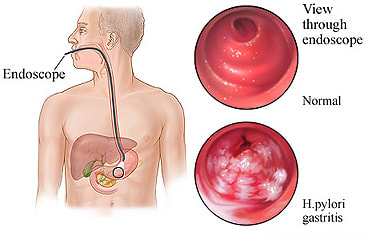
Overview
Gastritis is an upset stomach. It happens when something irritates the stomach lining. Many things can cause gastritis, such as an infection or illness, food or drink, or medicines. Your belly may bloat and ache. You may belch, vomit, and feel sick to your stomach.
Minor stomach upset can be treated at home. Medicines that reduce or block stomach acid may help. If gastritis lasts, your doctor may prescribe medicine.
Follow-up care is a key part of your treatment and safety. Be sure to make and go to all appointments, and call your doctor if you are having problems. It's also a good idea to know your test results and keep a list of the medicines you take.
How can you care for yourself at home?
- If your doctor prescribed antibiotics, take them as directed. Do not stop taking them just because you feel better. You need to take the full course of antibiotics.
- Be safe with medicines. If your doctor prescribed medicine to decrease stomach acid, take it as directed. Call your doctor if you think you are having a problem with your medicine.
- Do not take any other medicine, including over-the-counter pain relievers, without talking to your doctor first.
- If your doctor recommends over-the-counter medicine to reduce stomach acid, such as Pepcid AC (famotidine) or Prilosec (omeprazole), follow the directions on the label.
- Drink plenty of fluids to prevent dehydration. Choose water and other clear liquids. If you have kidney, heart, or liver disease and have to limit fluids, talk with your doctor before you increase the amount of fluids you drink.
- Avoid foods that make your symptoms worse. These may include chocolate, mint, alcohol, pepper, spicy foods, high-fat foods, or drinks with caffeine in them, such as tea, coffee, colas, or energy drinks. If your symptoms are worse after you eat a certain food, you may want to stop eating it to see if your symptoms get better.
When should you call for help?
Call 911 anytime you think you may need emergency care. For example, call if:
- You passed out (lost consciousness).
- You have severe belly pain.
- You vomit blood or what looks like coffee grounds.
- Your stools are maroon or very bloody.
Call your doctor now or seek immediate medical care if:
- You are dizzy or lightheaded, or feel like you may faint.
- You have trouble breathing or are breathing faster and passing only a little urine.
- You have new or worse belly pain.
- You have a new or higher fever.
- You have signs of dehydration, such as:
- Dry eyes and a dry mouth.
- Passing only a little urine.
- Feeling thirstier than usual.
- You have nausea or vomiting and can't keep fluids down.
- You cannot pass stools or gas.
- You have new or more blood in your stools or your stools are black and tarlike.
Watch closely for changes in your health, and be sure to contact your doctor if:
- You have new or worse symptoms.
- You are losing weight.
- You do not get better as expected.
Where can you learn more?
Go to http://www.healthwise.net/patientEd
Enter Z536 in the search box to learn more about "Gastritis: Care Instructions".
Current as of: October 19, 2024
Author: Ignite Healthwise, LLC Staff
Clinical Review Board
All Ignite Healthwise, LLC education is reviewed by a team that includes physicians, nurses, advanced practitioners, registered dieticians, and other healthcare professionals.

